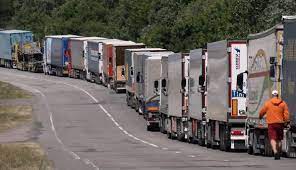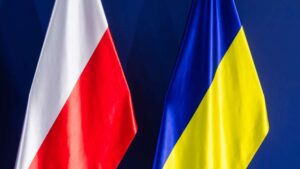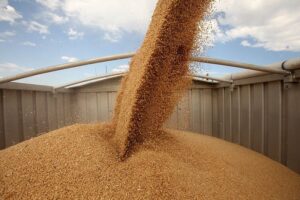
The All-Ukrainian Agricultural Rada (AAR) and the Association of Milk Producers (AMP) will hold a mirror strike in response to the protest started by Polish farmers against the transit of Ukrainian agricultural products through Poland and will not allow Polish trucks into Ukraine.
“In protest against the actions of Polish agricultural producers who began a strike and blocked the border crossing point (BCP) “Dorohusk – Yagodin” for cargo with Ukrainian grain, domestic agricultural producers decided to act in the mirror,” – noted in a press release of the WAR.
It is emphasized that Ukrainian agrarians have taken a strong stance to protect their interests and the domestic agricultural sector. During the strike, they will block the movement of Polish trucks through four international checkpoints, viz: The checkpoint “Dorogusk – Jagodin” on the Ukrainian side, in the municipality of Krakivets near the checkpoint “Krakivets-Korcheva”, in the village of Rata near the checkpoint “Rawa-Russkaya” and in the village of Shehini near the checkpoint “Shehini-Medika”.
The action will begin on June 10 at 10:00 and will last until 00:00, June 14.
As reported, for several days, Polish farmers have been blocking the PP “Dorohusk – Jagodyn” in protest against the influx of Ukrainian grain to the Polish market.
Only vehicles carrying humanitarian aid are allowed to pass. As part of the protest, two trucks with humanitarian aid will pass from Poland to Ukraine per hour, and none from Ukraine to Poland.
According to data for Friday morning, about 320 heavy trucks stood in a nine-hour queue to leave Poland for Ukraine at the Dorohusk border crossing point. According to the Ukrainian side, there were 3,185 trucks registered in the electronic queue to enter Poland.
The Polish protest is expected to last until midnight on Monday.

Poland has sent 14 MiG-29 fighter jets and 325 tanks to Ukraine, the Permanent Representation of the Republic of Poland to the EU has reported.
“Out of 575 tanks delivered to Ukraine so far, 325 have been transferred by Poland. The Netherlands ranks second (85), Germany third (80) and the United States fourth (76). In addition, out of the 28 aircraft transferred to Kyiv so far, Poland has sent 14 MiG-29 fighters,” the post on Twitter reads.
On May 8, Polish Defense Minister Mariusz Blaszczak announced the dispatch of MiG-29 fighters.
In April, Polish President Andrzej Duda said that Warsaw would be able to supply Kyiv with a total of 14 MiG-29 fighters.
The MiG-29 is a fourth-generation Soviet and Russian multi-role fighter developed in the 1970s. It is designed to destroy air targets with guided missiles and an onboard cannon and to engage ground targets with unguided munitions. It has numerous modifications. The aircraft is operated by more than 20 countries.

“Nova Posta”, the leader of express delivery in Ukraine, partly lifted restrictions on sending food products to Poland in international parcels, the press service of the company said.
“The government of Poland lifted restrictions on the import and transit of certain types of food products. As a result, Nova Posta has resumed accepting some products as part of international parcels that are sent to the EU,” the company said in a press release Wednesday.
In the list of products that can be sent abroad again: chocolate and chocolates with stuffing, waffles, cookies, gingerbread, chewing gum, crispbread, croutons and toast, ready-made sauces, ketchups, mustard, canned fish or fish roe – provided that such products are suitable for long-term storage, transported only in original undamaged packages and do not require special temperature storage mode. The total weight of products that are approved by customs authorities for shipment abroad is 10 kg.
However, it is specified that it is prohibited to ship meat, animal products, products of short-term storage or products that require a special temperature regime, dairy and fermented dairy products (including canned condensed milk). canned condensed milk); fruits, vegetables, edible fruits in any form (fresh, dried, dried, canned); nuts, seeds, coffee, tea; vegetable oils; grains and cereals and flour; cereals; sugar, syrups, jams, jams, fruit jellies, marmalade, marshmallows; purees and pastes of fruits or nuts, natural and artificial honey, fruit juices, vinegar, spices and eggs.
For a complete list of goods and cargo that are allowed or prohibited to send in international parcels, see this link: https://novaposhta.ua/delivery_to_Poland/3_PAMIATKA_UA_PL.pdf.
Earlier it was reported that Nova Posta has suspended the shipment of products to the EU due to restrictions on the export of Ukrainian agricultural products.
All company branches have suspended the receipt of any products in international parcels sent to the EU, due to the introduction of temporary restrictions on the import and transit of a number of food products from Ukraine – sugar, cereals, confectionery, fruits, vegetables, etc.
Founded in 2001 Nova Posta is the leader of express-delivery market in Ukraine. Its network consists of more than 6 thousand outlets throughout the country.
“Nova Posta provides a full range of logistics and related services.
It includes Ukrainian and foreign companies, including Nova Posta, NP Logistik, Post Finance (Forpost system) and Nova Posta Global.

The powerful interstate power transmission line between Poland and Ukraine modernized by NEC Ukrenergo together with Polish transmission system operator PSE has successfully passed a three-day test since April 27, the NEC said.
According to Ukrenergo, the total cost of the project amounted to 350 million UAH, in addition, about 1 thousand tons of necessary equipment was provided for free by Polish partners.
The company explained that the bulk of the work was done in this node, so that the electricity produced by the Ukrainian power system could be converted to the European voltage of 400 kV and transmitted to Europe.
“It was a complex but mutually beneficial project that we implemented in cooperation with our European colleagues. It is important both for Ukraine and the energy security of Europe,” commented Volodymyr Kudrytsky, chairman of the board of Ukrenergo, as quoted in the company’s Telegram feed on Tuesday.
According to him, the line will strengthen links between the Ukrainian and European energy systems, constituting an additional element of European energy security and contributing to the development of a stable energy network in Ukraine.
“If the needs are different, we will be able to import electricity from Europe,” Kudritsky said.
The NEC added that the total length of the line is almost 400 km, more than 70% of which runs through Ukraine. The line is connected to the backbone network through an open switchgear on one of the Ukrainian power facilities. On the construction of the facility from the Ukrainian side for five months during the war worked 125 specialists – 45 employees of “Ukrenergo” and 80 contractors.
At the same time, Polish operator PSE on its auction platform on Tuesday announced a one-month auction to allocate available cross-section capacity on the Rzeszow-Khmelnitsky line for delivery from May 15-31. The capacity offered in the auction is 200 MW for exports from Ukraine and 350 MW for imports from Poland. Under the auction terms, bids from bidders will be accepted until May 8 at 16:00, with the results to be announced by the same time on May 10. Since NEC Ukrenergo during the war can only conduct daily auctions according to the requirements of ENTSO-E, it has to conduct them two days before the delivery day, i.e. the first can be expected on May 13 for the same capacity to be distributed by the Polish operator.
At the same time, the market notes that for the first week of May, Ukrenergo does not distribute cross-section capacity on the Dobrotvir-Zamosc line, through which DTEK Zakhidenergo exports 75MW hourly to Poland, due to a number of holidays in this country and the failure to hold auctions by the Polish operator.
As reported, the reconstructed 400 kV line between KNPP and Rzeszow was scheduled to be put into operation at the end of April. Reconstruction of the 750 kV Khmelnitsky NPP (KNPP) – Rzeszow line, which has not been in operation since the 1990s, provided for its transfer to the 400 kV voltage used in the European grid. Its launch allows for a 25-30% increase in Ukrainian export potential. The line will operate in synchronous mode, i.e. all participants of the Ukrainian and European markets will have access to it.

Ukraine and Poland have agreed on the resumption of transit of Ukrainian agricultural products. It will work at night from April 20 to 21, 2023, according to the press service of the Ministry of Agrarian Policy.
Additional control measures will be applied to the transit, of which market participants will be notified publicly and in working order in the near future.

The list of agricultural products banned for import from Ukraine to Poland as of 16 April includes a broad list of grains, flour and starch, as well as, sugar, caramel, seeds for sowing, vegetables and fruits, including exotic ones, dairy products, honey, wine, livestock products and live animals, as well as dog and cat food packaged for retail sale.
According to the text of the annex to the decree of the Minister of Development and Technology of Poland Waldemar Buda dated April 15, 2023 (Interfax-Ukraine news agency has a copy), since April 16 imports of sugar maize (fresh and chilled) from Ukraine to Poland are prohibited, except for hybrids for sowing; Seeds of soft wheat and meslin, spelt, soft wheat and meslin, except for sowing, rye, barley, oats, grain sorghum, except for hybrids for sowing, buckwheat, millet, canary seed, other cereals, durum wheat: wheat and meslin flour; rye flour; wheat cereals; malt, even roasted; grain flour; and, corn, barley and oat flakes; wheat, corn, potato and other kinds of starch.
The list also included lactose, maltose, glucose, fructose in solid form; sugar syrups without added flavorings or colorings, artificial honey mixed or not with natural honey; and caramel. Also sugar beet, sugar cane, cane or beet sugar, including chemically pure sucrose, maple sugar and maple syrup. Melass obtained from the extraction or refining of sugar, beet pulp.
A range of seeds for sowing, including sweet corn hybrids, seed peas, chickpeas, crude rice, grain sorghum hybrids, linseeds; canola seeds, sunflower seeds (crushed or uncrushed; for sowing), other oilseeds and fruits; flax and hemp;
The range of fruits and vegetables prohibited for importation includes: tomatoes fresh or chilled, onions, shallots, garlic, leeks and other onion vegetables; cabbage, cauliflower, kohlrabi, leafy cabbage and similar edible vegetables; lettuce (Lactuca sativa) and chicory (Cichorium spp. ), carrots, turnips, salad beets, goatweed, celery, radishes and similar edible root vegetables, fresh or refrigerated. Also, cucumbers and gherkins, fresh or refrigerated; leguminous vegetables, peeled or unpeeled, fresh or refrigerated; nuts; fresh and dried bananas; fresh figs; pineapples; avocados; guavas mangoes and mangosteens; citrus fruits; table grapes, fresh; melons (including watermelons); papaya; apples, pears and quinces, fresh apricots, cherries, peaches (including nectarines), plums, other fruits.
It is prohibited to import not only raw vegetables, but also steamed or cooked in water, frozen, canned, dried. Under the ban are jams, marmalades, marmalades, fruit purees; wine, including grape juice and grape must; wine made from fresh grapes, including fortified wines; fresh grapes, except table grapes; vinegar.
The list includes a wide range of animal products: beef, veal, live animals of domestic species of cattle, except purebred farm animals; meat of cattle, fresh or chilled; beef frozen, salted, in brine, dried or smoked; Meat or meat by-products meal and meal; other prepared or preserved meat; live stock – thoroughbred breeding animals; preserved meat; by-products and offal; poultry meat and offal; Pig fat, meat and edible by-products of domestic pigs, sausages and similar products of meat, meat by-products or blood; swine fat (including lard); prepared products or preserves of the liver of any animal except goose or duck; pigs; mutton and goat meat; lambs (under one year of age), live sheep, except purebred breeding animals and lambs; sheep and goat meat; live swine; chilled and frozen swine meat; horses, including purebred breeding animals.